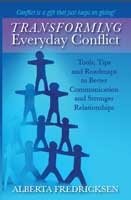Is Karma Fair?
Posted by Alberta in Choices, Inner Peacemaker, Practical Spirituality Karma, or cosmic justice, puts everyone into conditions where they can either learn or atone for something. Helena Roerich
Karma, or cosmic justice, puts everyone into conditions where they can either learn or atone for something. Helena Roerich
Is Karma fair? In Biblical terms, karma is reaping what you sow. As it turns out, that word “karma” has karma of its own. It sometimes has bad press because some people only think of karma as something bad coming back to punish them. It is really just the principle of cause and effect but it is not merely limited to an act like slapping someone and getting slapped back.
Karma is also the sum total of all we have done and all that has been done to us. It is not merely one action and reaction. It is the totality of our experience from the beginning of our existence. To understand karma, it helps for you to acknowledge that you are not just a body with a spirit inside of it; you are a soul—a spirit wearing many different bodies throughout time.
Karma helps us to understand why bad things happen to good people just as it demonstrates how good things happen to all people. It is one answer to our eternal questions about divine justice – about what is and is not fair.
Some people criticize and even reject the concept of karma by saying that it merely defines fate. This implies something preordained and unchangeable; something that you and I have absolutely no control over. Since karma is the principle of reaping and sowing and since we play a very active role in sowing, it only makes sense that we must play a very active role in reaping—in experiencing consequences, seeking forgiveness and or in making restitution.
God has given us free will, and this inviolable decree of God is demonstrated throughout the history of every religion. But we also know that many of us will not notice that a lesson is being presented unless something first makes certain that we are paying attention. That’s what karma does—it comes to us in a way that definitely gets our attention!
So how can you set up to learn from the karma of your circumstances?
- Recognize that you always have a choice. Yes—you always have a choice! You can do – or not do – something. You can choose whether you will react or respond to what appears before you. You can choose how you will feel about what is happening – and even more incredibly, you can choose what you will think. Everything begins with what you think. Then you add energy to your thoughts by having a feeling about them. You choose to act in some specific way based on what you think and feel. You get to choose!
- Be grateful for what is! Remember that what you are feeling is getting your attention for a reason. You are being placed in a position to make a NEW choice. Choose to acknowledge what is actually happening and let it be OK just like it is for this moment. Choose to thank God or someone else who played their part in getting your attention. Your decision to think and feel gratitude even in the midst of pain or conflict helps clear the energies for you to create something else.
- Choose the next best step. Gather your energies and your resources. What are your choices? What are the consequences of each choice? Think about how you would like to feel after you have made the next choice—then choose the next best step!
What comes next? Whatever it is, be grateful for it! It’s a good thing because now you can choose again!
Is your karma placing you in the middle of conflict?
Alberta Fredricksen can help you understand just how natural conflict is and how it can be a creative force for change, empowerment and transcendence. If you are looking for a greater sense of HeartPeace, visit her website at www.HeartPeaceNow.com for more FREE resources and articles.


